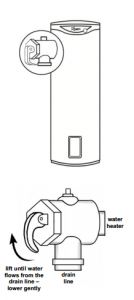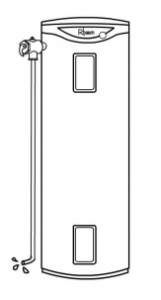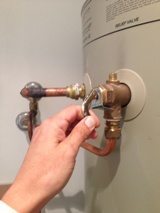Want to make sure your hot water doesn’t tank this winter? This one maintenance check takes just 5 seconds and will help to keep your water heater running safely
Have you heard of exploding hot water tanks? It might sound like the beginning of a Myth Busters episode (it was), but it is a real consequence of water tanks under pressure (really!). Read about this hot water heater that became a flying projectile: hot water tank under pressure. This, and the possibility of your water cylinder failing, is why water heater manufacturers recommend that you check your tank’s pressure relief every winter. Every tank has a Pressure and Temperature Relief (PTR) Valve, which is essential for the safe operation of storage model water heaters.
1. Find the PTR valve
The purpose of the valve is to release pressure build-up, which occurs when the water heats up and expands. Never block the outlet of this valve for any reason. The valve is always near the top of the water heater, at the same level as the hot water outlet. It may be labelled but if it isn’t, it looks like this. 
2. Identify the drain line
It is normal for the valve to release a little water through the drain line during each heating period. The drain line runs from the valve down the tank and empties at the foot of the heater. Make sure there are no obstructions to the drain line.  If water is leaking continuously, this indicates a problem with your water heater and you should call your plumber to check it out.
If water is leaking continuously, this indicates a problem with your water heater and you should call your plumber to check it out.
3. Perform a 5-second check
On the PTR valve you’ll see the easing lever or a cord that operates a lever. Standing out of the way of the drain line, gently lift the lever or pull on the cord and let it snap back.  This should release water into the drain line. Be careful, as this water will be hot. If the water does not flow freely during this check, you will need a new valve. If you do not replace an underperforming valve, the best-case scenario is that your water cylinder fails. The worst-case scenario is the pressure build in the tank could cause your hot water heater to explode—ouch!
This should release water into the drain line. Be careful, as this water will be hot. If the water does not flow freely during this check, you will need a new valve. If you do not replace an underperforming valve, the best-case scenario is that your water cylinder fails. The worst-case scenario is the pressure build in the tank could cause your hot water heater to explode—ouch!

